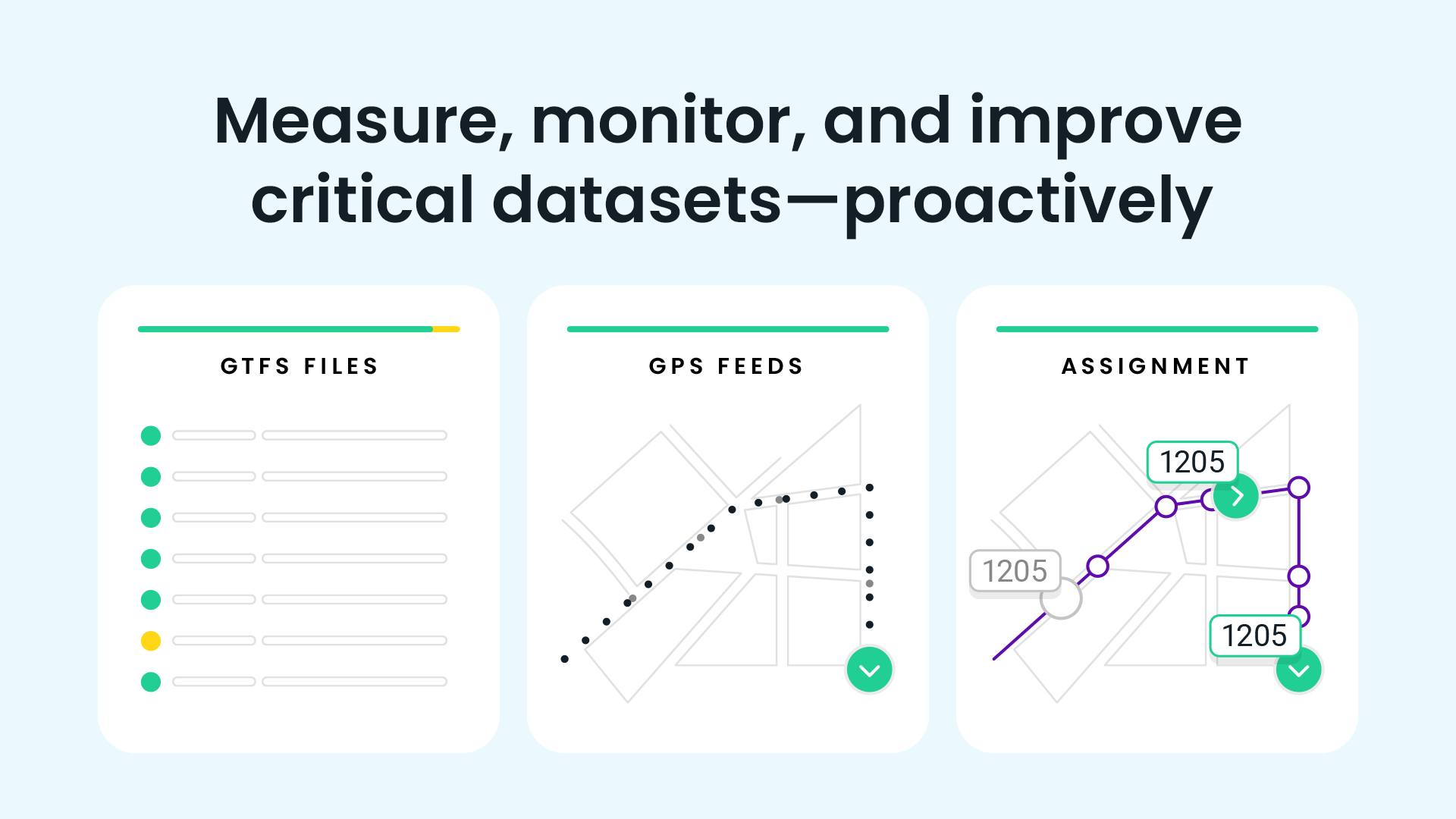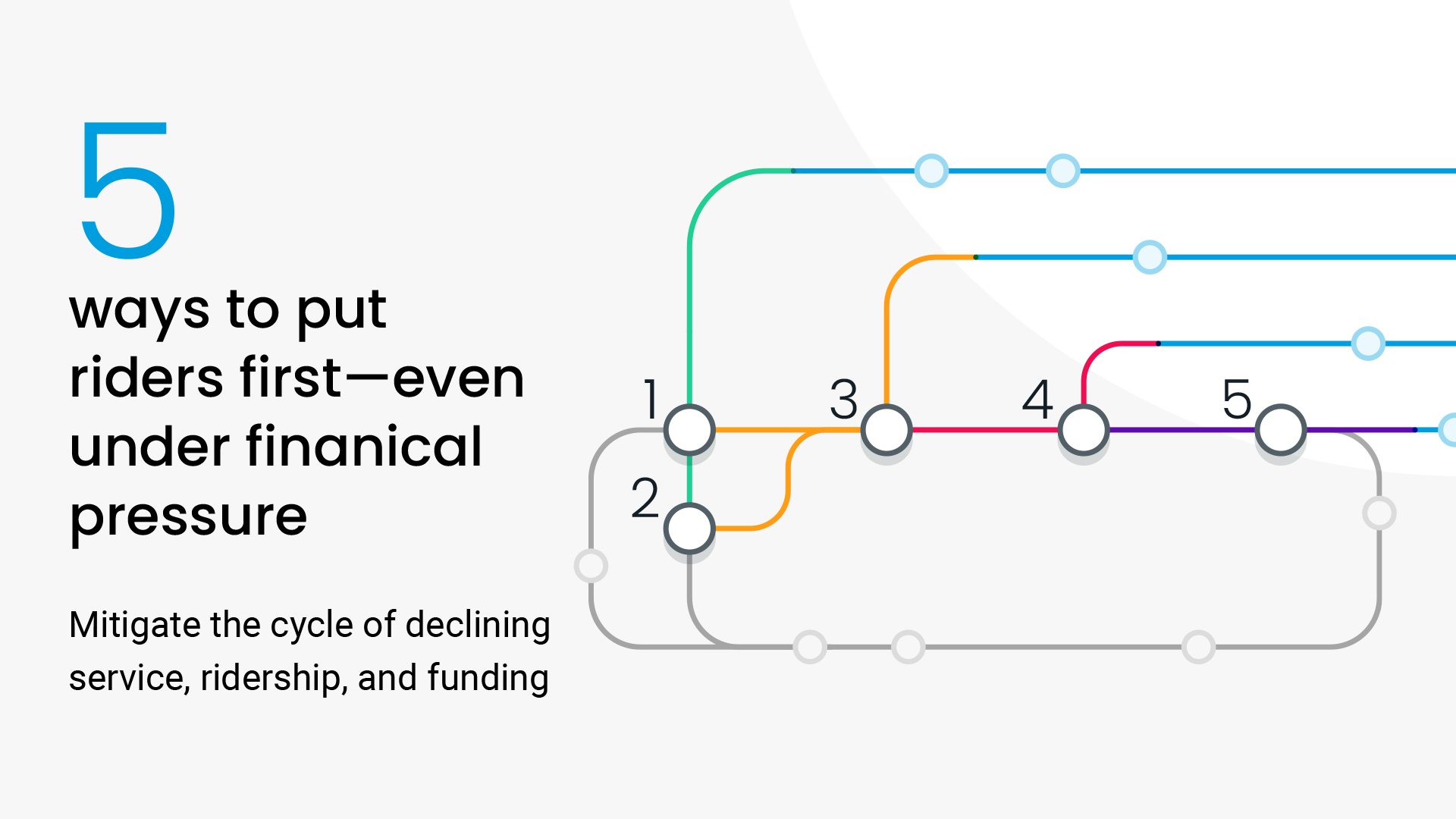
April 3, 2023
Partnering with transit agencies to evolve the GTFS-rt standard

April 3, 2023
Partnering with transit agencies to evolve the GTFS-rt standard
April 3, 2023
Partnering with transit agencies to evolve the GTFS-rt standard
Transit agencies today are operating in an increasingly connected world. Passengers expect to receive real-time information on the device and app of their choosing, and agency staff members want collaborative, cloud-native software tools to efficiently do their jobs.
Data standards are the digital bridges empowering transit agencies to share data seamlessly across internal and third-party software and devices.
GTFS-rt has arrived as the definitive data standard for transit data - where a bus is in real time, where it is going, and when it will get there. Transit agencies use GTFS-rt today to standardize data across consumer-facing applications, internal staff software, on-vehicle hardware, and with third-party partners.
Open data standards like GTFS-rt are constantly evolving. It requires collaboration and sustained investment from the transit community for data standards to evolve with changing industry needs and technological advancements. This includes partnership between transit agencies and solution providers, who can lend technical expertise to address specific agency pain points.
Swiftly has consistently been involved with the development of data standards, dating back to our co-founder Mike Smith’s collaboration on the original GTFS standard. Working with over 135 transit agencies to generate GTFS-rt feeds for agency and third-party app consumption, we witness firsthand usability challenges and opportunities for improvement. Agencies will frequently approach Swiftly with proposed improvements to the GTFS-rt standard, and we are thrilled to contribute our resources for solutions that benefit all transit agencies using the standard.
Frequent service cancellations complicate the rider experience
This was the case with a recent proposed change to the GTFS-rt standard that I authored.
First, the context: Agencies today are struggling to deliver their scheduled service in the face of a widespread operator shortage. When agencies do not proactively cancel service, third-party trip planning applications default to showing scheduled trips, causing passengers to wait for a bus trip that will not arrive. My colleague recently wrote how agencies can use their GTFS-rt feed to cancel service and prevent ghost buses.
Agencies struggling to provide their planned service due to operator shortages or other interruptions typically cancel the originally scheduled trips and then create new, less frequent trips based on the service they are able to provide. For example, an agency with scheduled ten minute headways on a given line might cancel all the trips for a day and add a new set of trips with 15 minute headways.
This is where the limitations of the existing GTFS-rt standard appeared. In a trip planning app, the rider would see dozens of canceled trips alongside the newly added trips. This creates a confusing display of information for the rider; they’re looking for simple, accurate information on when a bus will arrive, but instead they see behind the scenes details of a transit agency’s operations.
The Maryland Department of Transportation Maryland Transit Administration has been a longtime Swiftly customer and a pioneer for improving service with better transit data. Staff at the MTA shared this gap in the GTFS-rt standard’s functionality with the Swiftly team, and we worked on a proposal to improve the rider experience.
The proposal contains a summary of the change:
This proposal adds a new trip schedule_relationship of DELETED, which can be used to convey that a transit provider intends for a trip to entirely disappear from public-facing applications. To minimize impact on current implementations and maximize simplicity, the DELETED enumeration would be defined with the same definition as CANCELED but with additional precision: “A trip that existed in the schedule but was removed and is not intended to be seen by users.”
This addition to the spec immediately removes ambiguity over how to implement CANCELED for consumers. For producers, it allows service providers to communicate removals of service in a way that reflects rider understanding of the service - i.e., frequency-based, show-up-and-go service removals might be understood differently from less frequent services, or services where users know and understand the service at the trip level.

With this change, agencies have more control over how real-time passenger information is displayed in third-party applications, and riders receive more streamlined information to plan their trips. The proposed change is currently an experimental part of the GTFS-rt specifications and will follow Mobility Data’s standard practice on receiving input from transit agencies and GTFS-rt consumers before it becomes fully incorporated into the standard. We’re thrilled to have been able to collaborate with our transit agency partners on this improvement to the rider experience.
To learn more about how agencies are using standards like GTFS-rt, fill out the form to access the recording of our recent webinar featuring Bibiana McHugh, one of the authors of the original GTFS standard.
Request a demo
Areas for continued improvement
This is the third time that Swiftly has contributed to the GTFS-rt standard, and we anticipate continued involvement with the community as the standard evolves.
We’re already eyeing a few areas where the GTFS-rt standard can continue to improve.
Service disruptions, such as cancellations, are top of mind as agencies respond to operator shortages. There is additional functionality to explore in this area, including enhancements to detours such as the ability to add temporary stops. There are also ongoing conversations about how schedule changes should best be communicated to riders. Improvements here will help agencies struggling to keep riders informed as they update service on a weekly or even daily basis.
GTFS-rt has become an invaluable tool for transit agencies to stay agile in the face of challenges and connect with riders on all the channels available to them. We’re grateful for the efforts of all the transit agencies and technology providers that have collaborated on the GTFS-rt standard. One of the strengths of an open data standard is that when one transit agency shares a limitation, all transit agencies benefit from the solution. We look forward to continuing to collaborate with transit agencies and technology providers to ensure GTFS-rt can be the best tool possible to serve transit agency staff and their riders.
The rich text element allows you to create and format headings, paragraphs, blockquotes, images, and video all in one place instead of having to add and format them individually. Just double-click and easily create content.
Last Name, Agency

What’s a Rich Text element?
What’s a Rich Text element?
What’s a Rich Text element?
What’s a Rich Text element?
What’s a Rich Text element?
The rich text element allows you to create and format headings, paragraphs, blockquotes, images, and video all in one place instead of having to add and format them individually. Just double-click and easily create content.
Last Name, Agency
Static and dynamic content editing
A rich text element can be used with static or dynamic content. For static content, just drop it into any page and begin editing. For dynamic content, add a rich text field to any collection and then connect a rich text element to that field in the settings panel. Voila!
How to customize formatting for each rich text
Headings, paragraphs, blockquotes, figures, images, and figure captions can all be styled after a class is added to the rich text element using the "When inside of" nested selector system.
- text goes here
- text goes here
- text goes here
- text goes here
- text goes here
- text goes here










